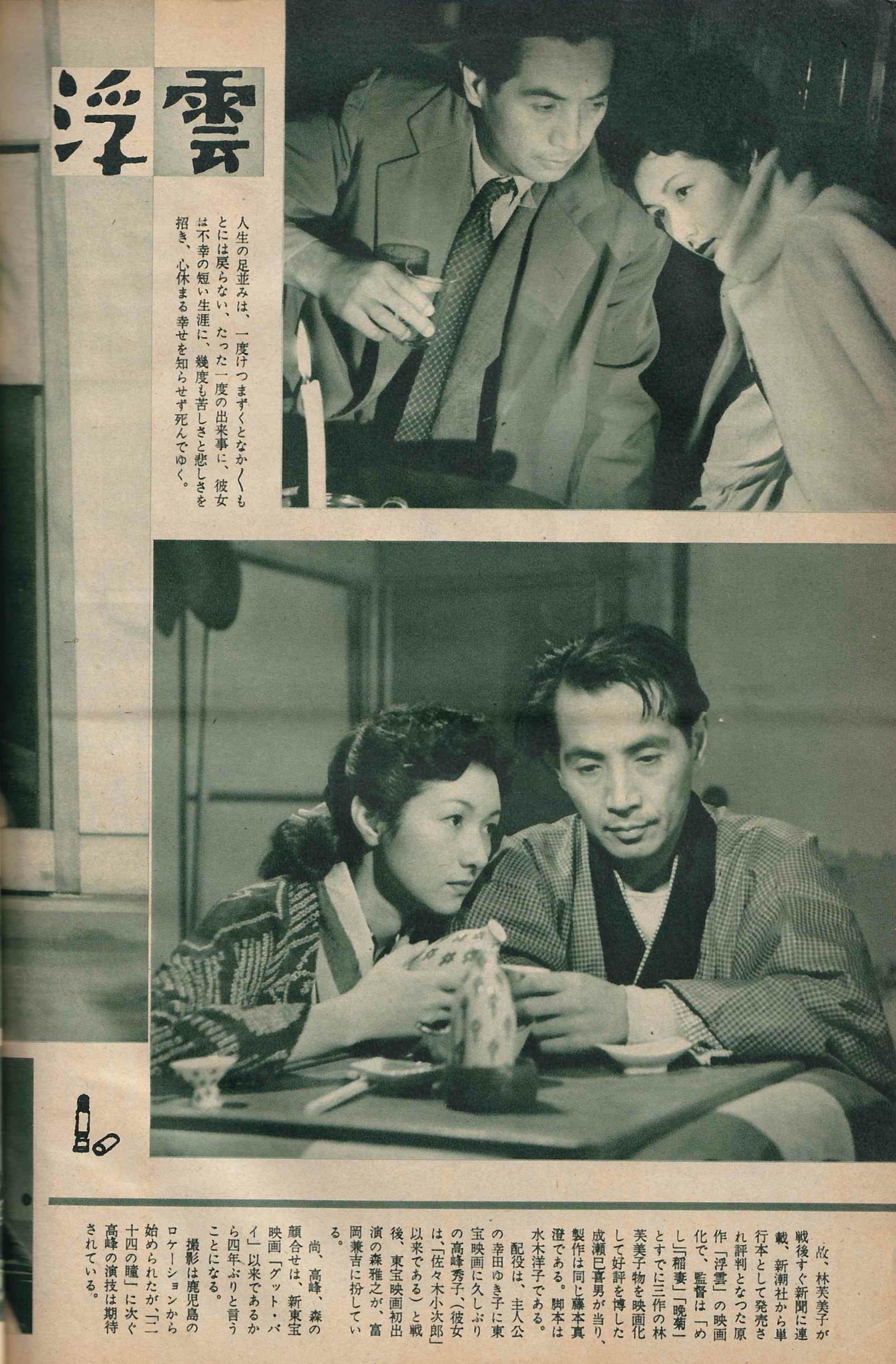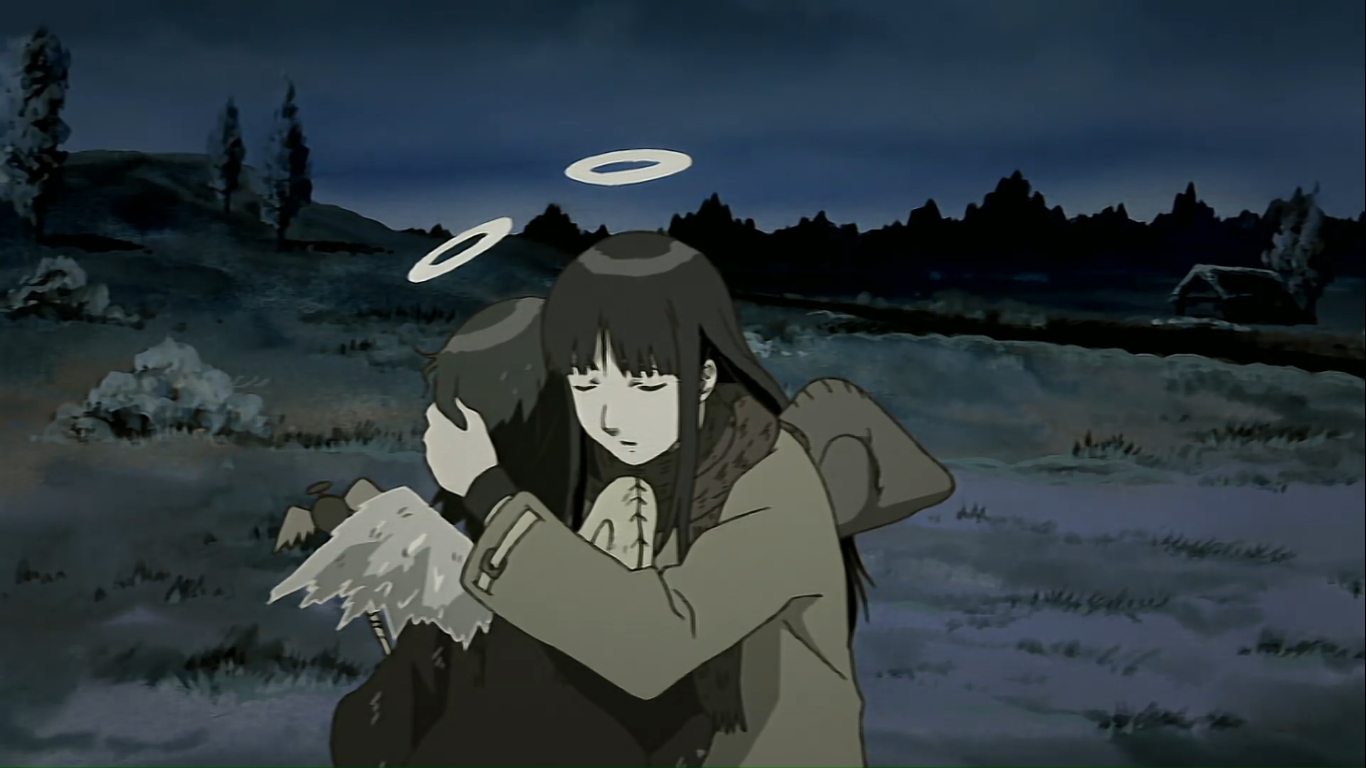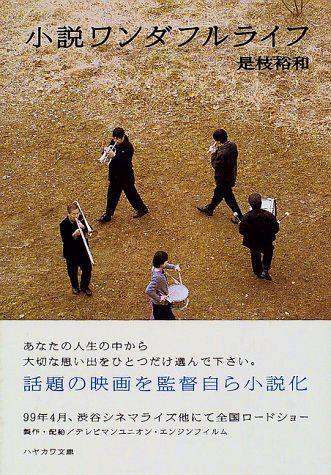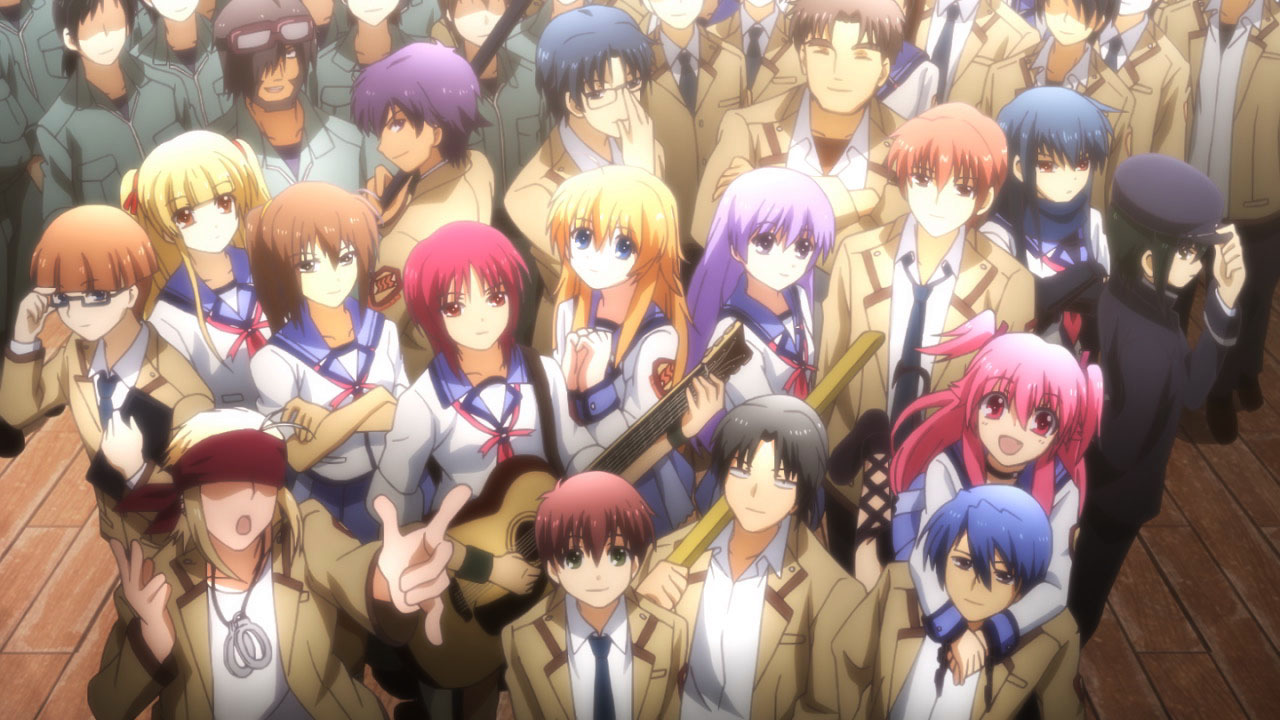
while watching i was fiddling around cleaning up my the files on my desktop, this is because it's not the most engaging movie moment to moment, and I felt my mind would probably have been wandering otherwise. However, I slightly regret this as the movie ended up being more interesting theme wise than I anticipated. I watched it because someone said utena was inspired by it, I haven't seen utena. The plot can be compared to to the other meriad of films about mean headmistresses at boarding schools, that element is the most boring part of the movie to me. The most interesting, and fun to watch scenes are of the relationship between the new student and the kind teacher, they are the two best actors, characters, and they're rather pretty. thought provoking ending, which is kind of in the style of old movies.
essential viewing for fans of the purest form of love, and films from expressionist era. watch here: https://www.youtube.com/watch?v=0s0WWmx3J0U



HAIBANE RENMEI
A close equivalent might be kino no tabi, where in kino no tabi you visit all these towns with odd unique cultures, and it's all kind of rural, like it takes place in the middle ages, but you also have bits of modern technology. They both came out in that
transitional period between analogue and ditigal, so they have that charm that only those late 90's and early 2000's anime have. The atmosphere resembles after life, it's laid back, relaxed, but Haibane Renmei has a lot more humor, it's highs and lows of emotion
are more pronounced. I guess it's got more of a pulse. But it's comfy all the same. The setting in this one may be my favorite part, getting deeper into the towns culture and belief system, feeling out some of the mysteries in the world, is just really satisfying.
Like, fulfilling in a strange primordial way. But it doesn't go that deep into the wordbuilding, it's basically background details, which is honestly how i like it best. makes it feel very real.
Since watching it I've thought Haibane Renmei is something like the imageboard of anime. Old home is one small imageboard with it's own culture, and the factory is another one that they can't really mesh with, and get into fights with sometimes, but try to get along with anyway. People appear with no history and no name, and they stick around for a time posting and having fun before one day dissapearing for a reason you can never know. It's that melancholy of a small tightknit community and it's slow fading away, with nothing to hold on to. Reki's the oldfag who knows what things were like before everyone else came. All of the interesting thing happened a long time ago, and when Reki goes they'll go with her.
ANGEL BEATS
This is the one I saw the longest time ago of all of these, and it's the one that leans most heavily into high emotions. It's got lots of back and forth comedy dialogue, and honestly it's really funny, if it was a comedy anime it would rank among the highest, but
I don't think something can be a comedy if it makes you cry buckets. This show doesn't share in the slow meditiveness of the other two, but it leans really hard into the sentimentality, the theme of letting go of the past.
really this extreme sense of sentimentality that comes through is only heightened to an excruciating degree now that i'm coming back to it, as that extra feeling of nostalgia just stacks on top of it. honestly, i really have a hard time dealing with stories like these, where the message is about moving forward, saying goodbye, or generally ruminating on the passing of things. as someone who hates change and tries at all times to reject nostalgia, that i don't just hate these three works and try to forget about them probably speaks to their virtues. Haibane renmei is my favorite of the three, for me it really strikes that perfect balance between the two, the dry detachment of After life, and the waterworks that angel beats causes. They're both a bit strong for me to handle. And haibanes personal message speaks to me a bit more directly than the other two. It's the medicine that I can stomach. The one that that sits right with me.
There's an obvious reason why you might set a story in the after life. It's to give an outside perspective on living, something we can't really get. Like, you can't really describe a building until you've stepped outside of it.
BONUS: if you watch both angel beats and after life, you'll notice one very striking simularity between them, which i'm not gonna tell you.

Floating Clouds, by Naruse. I watched it because I liked the title. The title is probably a metaphor for the protagonists, who spend the runtime of the movie putting off a relationship with eachother, drifting around to different jobs and having brief relationships with other people. Some dramatic things happen in the film, but none of them are really shown, like there's a robbery at one point, and a murder at another, but they are only talked about. I'm sorry for any wrong details, it's been a little while. The movie is kind of about apathy, and it has a fittingly apathetic mood to it. It's romantic, sentimental, and ends as a tragedy, but it's not actually a very emotional watch.
After watching it, I thought "Meh" and forgot about it, but just now it came back to me and I think I should rewatch it. Not right now though, I don't feel like it. The girl's cute.
21.11.5
First, there's a dream in Dolls. Now, I have no idea what it means. However, I think I do have some idea.
Before the dream, is the scene of her next to the shore, with two people fishing nearby. Then the dream happens, and it's of her and her boyfriend getting dragged away by scary guys in masks(I don't understand the masks, I don't understand the festival setting). Then there's an image of a fish in a yukata, so I think that the fish is representing helplessness, from the fishing scene, and the fish represents herself, so the dream is about her feelings of helplessness. This dream is extremely interesting because it's the dream of a woman who has lost the ability to speak, and most likely think verbally, so the movie has to explain her inner thoughts using creative means. That's what the dream is to Kitano, I think.
Then Kikujiro, which is the most DREAM movie Kitano has made(I haven't seen every movie he's made, so maybe not).
Kikujiro is about the boy. He has three dreams, the first is a nightmare after he's almost molested. The second is after he sees the yakuza tatoo. The third is after Kikujiro gets beat up(The third one is actually while he is awake, showing how his imagination is running wild as he sits alone on the bench, but it's in the same presentation and format as the other dreams, so I guess we can say this is a daydream.).
Three nightmares as he goes on this road trip. He's a taciturn, stoic little fellow, who doesn't speak much, so these dreams are our insight into how he's feeling. He's feeling pretty bad, evidently. All three of these dreams also have le spooky hisaishi music playing.
The fourth dream is the happy one, it uses the main theme instead of le spooky music, and it's of the good time he had with Kikujiro and the other weirdos at the campsite. The movie doesn't really have a clear progression until you see these dreams as the primary narrative, it's how the kid is internalizing and remembering the events of the movie, and it gives the events their meaning. Things are scary and weird, but at the end they're happy. So kikujiro is the only movie that's made me cry a month after watching it, but not while watching it. I might just be a bit dim-witted though for not putting that together earlier.
The most famous road movie, I have no idea, but one famous road movie is Alice in the Cities, which is likely the most similar movie to Kikujiro in concept. I think Kikujiro should be more respected, and one of the essential road movies, next to Alice in the Cities, but a couple pegs higher.
21.11.5
EDIT DECEMBER 21. I REMOVED A BUNCH OF COMPLAINING ABOUT "FAKE HIKKIS". THAT I THOUGHT THIS WOULD BE A GOOD IDEA TO WRITE ABOUT THAT SHOWS I AM A LECH. ALSO, THIS CHARACTER ISN'T EVEN A HIKIKOMORI. I'M ASHAMED.
EDIT JANUARY 7. NEVERMIND I STAND BY MY ORIGINAL DECISION, FUCK NORMALFAGS. CAPS LOCK IS CRUISE CONTROL FOR COOL. ORIGINAL WRITING:
I saw a comment on the film saying "Social distancing before it was cool". I have a bit of a problem with this, even though it's a joke. It's about the impetus for the self-exclusion. A normalfag certainly felt social isolation, since they were socially isolated, but it is simply a different case from a person who was driven to social isolation for social reasons and made the choice for themselves(or even reasons other than social, of course the protagonist's motivation in the film is vague, and of course the motivations for an average shut-in are likely complex and differ between individuals.). Normalfags were socially isolated for... Other reasons.
A man in prison on false charges and a man in prison for rape and a man in prison for revolutionary activity are not all in prison together. They are in the building called prison, but that's virtually meaningless.
They are all going through different experiences. Couple that with the fact that people who choose social isolation have an entirely different perspective on it. A man in prison to help break out his friend, a man in prison for the food, routine and bed.
Again, I highly recommend this film. Anyone can watch it and enjoy it, the fact that it's as popular as it is means that it must speak to a diverse selection of people with different experiences. Maybe the character can be enjoyed as a novelty, or a hypothetical extreme. But for some, it's very deep and very real. Comically so. If it's not written from personal experience, it's a dizzyingly impressive case of empathy.
(I mean absolutely no derision with the term Normalfag, even if that seems hard to believe. I've simply spent too much time on imageboards, and it's a handy term that I prefer to something like "The masses" which I find, ironically, infinitely more condescending, even with it being so common. It seems like a natural disposition to look down on the nameless other. Normalfag isn't even rude, being normal is, simply, normal, and of course no one in this world is truly normal. "The masses" though, is harmful, as it diminishes individuals down to a herd, to a form, a shape, and I think that that is truly villainous. I do hate gays though(Just kidding! I watched Doukyuusei and became gay after, as all men do after watching Doukyuusei!(I do hate myself though)(is this bracket thing funny?)).)
One more thing, I'm very happy this film doesn't step into the quicksand that stories on Hermit-types often do, which is to thrust people into their lives who bring them on adventures. Surely it's difficult to write a story about a person who does nothing, so this film is singularly great in it's non-conformity.
11.13
The attribute of music in film, is that is transmits emotions directly. A harsh chord transmits discomfort, it's a biological response. Images can also do this, but images are more subjective. A person may see a corpse and think to themselves "Maybe they deserved it" or "That's so sad!" or "Ew, that's disgusting". Everyone has the same reaction to a sharply dissonent string attack. Music theorists like to say music is subjective, that african tribes or south indians or whatever have slightly different conceptions from Americans, so music is not universal. I think that's idiotic, but I digress.
In this anime, either Mushoku Tensei or Paranoia Agent, as those are the ones I've been watching lately, there is a bgm that plays behind daily life, and on top of the song being easy-listening, you become conditioned to a certain reaction to the song because it's always playing in scenes where the characters are in no danger, and are joking around. Then the BGM plays in a scene where there is some turmoil boiling in the background, and it has a dissonant effect. It feels like the danger that you've identified is unbeknownst, unacknowledged.
Another moment in Mushoku Tensei that I actually can remember, is in the Animal Village, when they are talking about their teacher-beast lady, ok this is the scene I've remembered it, you can tell the wolf man is getting super angry but the music doesn't change from the comfy theme, this creates a really interesting dissonence between the world and your perception, abnd when the angry beast dude raises his voice and makes everyone scared the music stops. Which is fairly common. But it's interesting here, because this kind of social situation is so common between people, that you have a viceral reaction to it, you freeze, and your heart beats heavier. The music cutting out accentuates this already quite human and instinctual response.
A movie that plays with score is Hausu, by that one guy I don't remember his name. In the beginning segment the teacher is walking with a student, and happy music is playing, then one of them mentions THE HOUSE, and the music suddenly cuts to a terrifying horror score, but the tone of the conversation didn't change at all, they mentioned the house innocuously, and as they go on talking the music suddenly goes back to normal. It's fucking hilarious, but also extremely interesting. I don't think you could get away with exactly that in a serious context, but I think that idea has serious potential.
One last thing. Just as the camera is a character in the story, the music is the mind of the camera. It defines the perspective of god. In The Big Blue by the french guy, the main character is dying, and he wants to die, and the music is magentic and moving, but then a sharp cut takes place as the defibulators resurrect him, and the music cuts out completely, and you are met with the harsh sound of his gasping. The film has the perspective that death is beautiful, and living is disgusting, and it conveys this viewpoint with the edit and with the score.
11.13
SPOILERS: I'm gonna spoil it... Ok, the woman who dies standing in her apartment reminiscing about walking on the beach with the protagonist, it shows her standing there, then cuts to the memory, then cuts back to her standing. This happens again when the protagonist is reminiscing about her, after she's dead. This minimalistic cut Takeshi kitano uses in every movie, and it's curtness, directness or whatever, severely contributes to how emotionally painful these scenes are. And it's how real memories work too, you get instantly transported to a place in the past, then thrust back to the present when something wakes you.
Anyway, I'm beginning to think Film Blogging is retarded because I have to describe scenes instead of just showing them... As for their comedy style, it's not that similar, just their film making is. I only just realized now that they're both comedian-first, filmaker-second people- isn't that interesting? Just a coincidence?!?!
I don't have much to say really, so I'll just rank both their filmographies.
ANNIEHALL > CRIMES > MANHATTAN = HANNAH (The ending of manhattan is one of my favorite moments in film EVER. the film as a whole? its fine.)
SONATINE > BOILING POINT > KIKUJIRO = DOLLS > KIDS RETURN = SCENE AT THE SEA > VIOLENT COP > HANABI > BROTHER
Ok, anything else I can write?... Not right now...